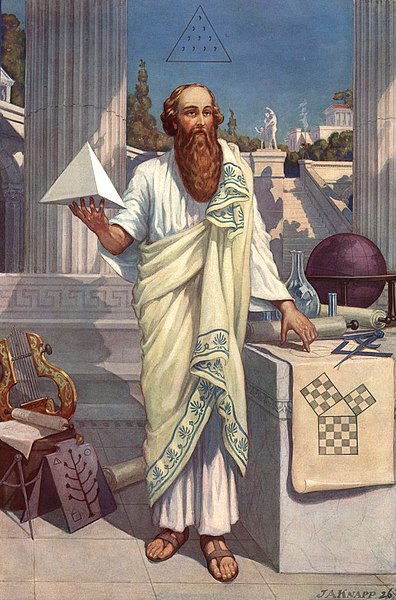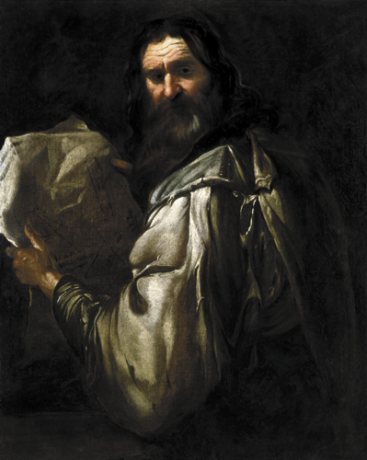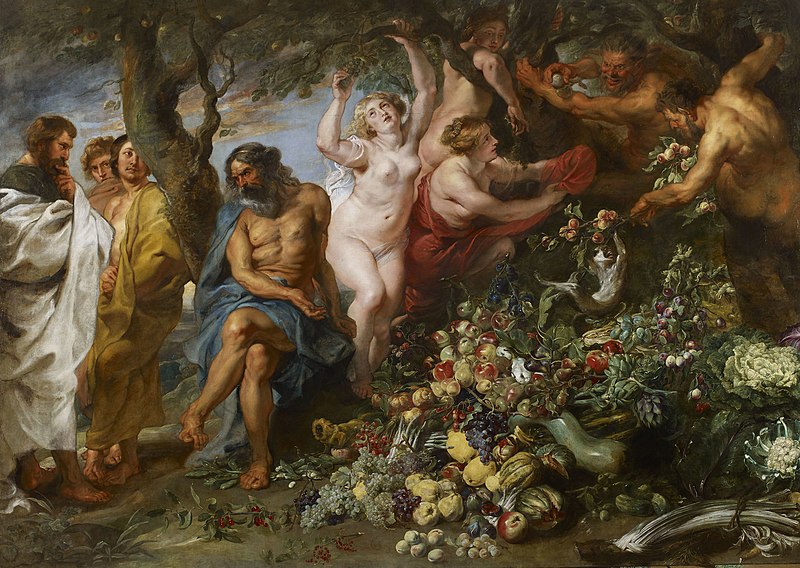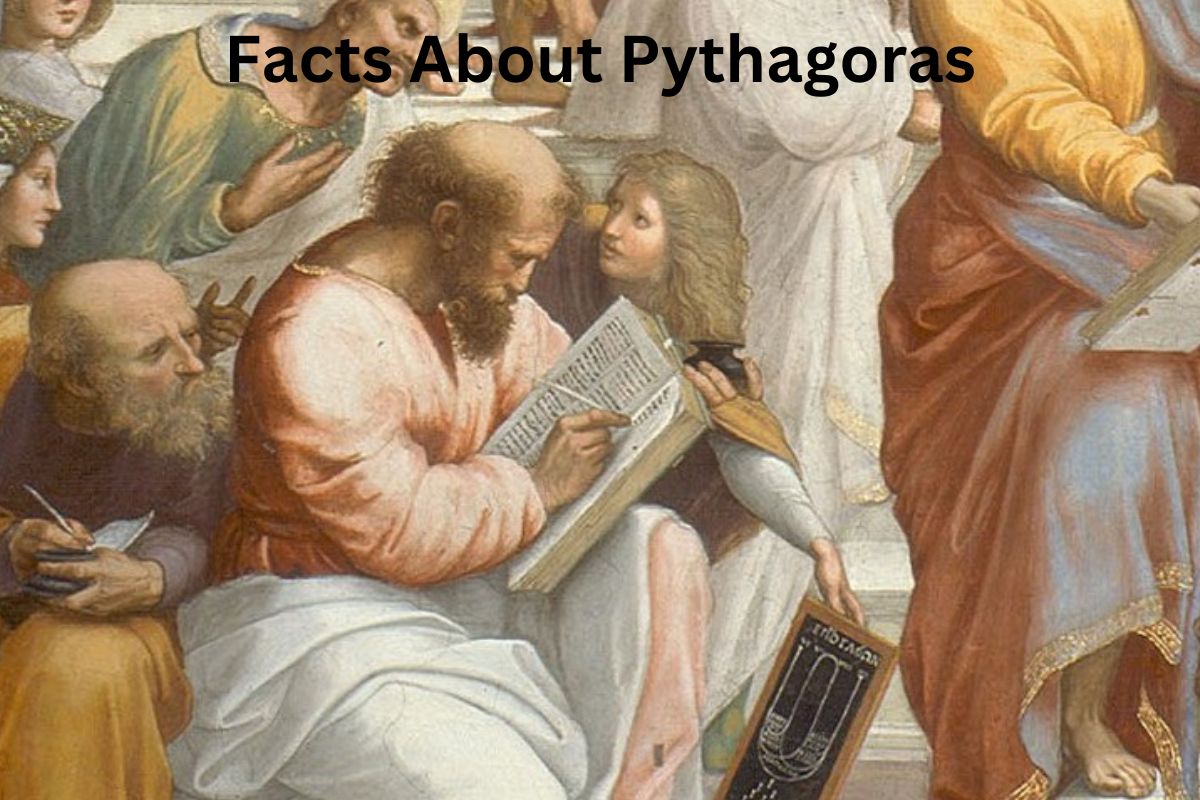Pythagoras was an ancient Greek mathematician and philosopher who lived in the 6th century BCE. Born on the island of Samos, he later established a school and religious community known as the Pythagorean Brotherhood in Croton, southern Italy.
Pythagoras is best known for his discovery of the Pythagorean theorem, which states that in a right-angled triangle, the square of the hypotenuse is equal to the sum of the squares of the other two sides.
He believed in the mystical and spiritual qualities of numbers, viewing them as the fundamental building blocks of the universe.
Pythagoras and his followers made significant contributions to mathematics, music theory, and explored concepts in astronomy, cosmology, and medicine.
Despite the scarcity of surviving texts, his teachings and ideas influenced later philosophers and mathematicians, shaping the development of Western intellectual thought.
Pythagoras Facts
1. Pythagoras was an ancient Greek mathematician and philosopher who lived in the 6th century BCE
Pythagoras is most famous for his discovery of the Pythagorean theorem, which states that in a right-angled triangle, the square of the length of the hypotenuse (the side opposite the right angle) is equal to the sum of the squares of the other two sides.
This theorem has been foundational in geometry and is still widely used today in various applications, such as engineering, architecture, and physics.

2. Pythagoras was born on the island of Samos in Greece, but he later moved to the city of Croton in southern Italy
Pythagoras was born on the island of Samos, which was a Greek colony at the time. However, he later moved to the city of Croton in southern Italy, where he established a school and religious community known as the Pythagorean Brotherhood.
The Brotherhood was not just an educational institution but a tightly-knit society that aimed to live according to Pythagorean principles.
3. The Pythagorean Brotherhood was a secret society that combined elements of mathematics, philosophy, religion, and mysticism
The Pythagorean Brotherhood blended various aspects of mathematics, philosophy, religion, and mysticism into its teachings. Pythagoras and his followers believed in the immortality of the soul and the concept of reincarnation. They also emphasized the pursuit of knowledge, ethical conduct, and the importance of self-discipline.
4. Pythagoras believed that numbers were the fundamental building blocks of the universe and that they had mystical and spiritual qualities
Pythagoras believed that numbers held a profound significance in understanding the universe. He assigned mystical and spiritual qualities to numbers and believed that they represented the essence of reality.
Pythagoras and his followers explored the relationships between numbers and their application to various phenomena, believing that numerical patterns governed the workings of the world.
5. Pythagoras and his followers made significant contributions to the field of mathematics

The Pythagoreans made significant contributions to mathematics beyond the Pythagorean theorem. They discovered several mathematical relationships and properties, expanding the field of number theory.
They investigated the concept of perfect numbers, which are numbers that are equal to the sum of their divisors, excluding the number itself. The Pythagoreans also studied triangular numbers, polygonal numbers, and harmonic proportions.
They delved into geometry, exploring the properties of polygons and regular solids, and made advances in music theory by discovering the mathematical ratios between musical notes that produce harmonious sounds.
6. Pythagoras is often credited with the discovery of irrational numbers
Pythagoras and his followers are often credited with the discovery of irrational numbers. These are numbers that cannot be expressed as a fraction and have an infinite non-repeating decimal expansion.
The discovery of irrational numbers posed a significant challenge to the Pythagorean belief in the supremacy of whole numbers and ratios. Legend has it that the discovery of irrational numbers was unsettling to Pythagoras and his followers, as it contradicted their belief in the harmony and perfection of the cosmos.
7. The Pythagorean Brotherhood had a strong focus on vegetarianism and the ethical treatment of animals

The Pythagorean Brotherhood had a strong emphasis on vegetarianism and the ethical treatment of animals.
Pythagoras believed in the concept of metempsychosis, or the transmigration of souls, which meant that the soul could pass from one body to another after death.
As a result, the Pythagoreans believed it was wrong to harm or kill animals, as they considered them to be fellow beings with souls. They advocated for a vegetarian lifestyle as a way to show respect for all living creatures.
8. Pythagoras’s teachings and beliefs had a profound influence on later philosophers and mathematicians, including Plato and Euclid
Pythagoras’s teachings and beliefs had a profound influence on later philosophers and mathematicians.
Plato, the famous Greek philosopher, was greatly influenced by Pythagorean ideas and incorporated them into his own philosophical system. Plato’s student, Aristotle, also recognized Pythagoras as one of the key figures in the development of mathematics and philosophy.
Euclid, the renowned mathematician of the third century BCE, drew upon Pythagorean principles in his influential work “Elements,” which became the foundation of geometry for centuries.
9. Pythagoras is also associated with the discovery of the five regular polyhedra, known as the Platonic solids
Pythagoras and his followers made contributions not only to mathematics and philosophy but also to other scientific disciplines.
They explored concepts in astronomy and cosmology, proposing that the Earth was a sphere and that the universe followed certain mathematical principles. They believed in the existence of celestial harmony, asserting that the movements of celestial bodies were governed by mathematical relationships.
Pythagoras also had an interest in medicine and believed in the interconnectedness of the body, mind, and soul, emphasizing the importance of holistic well-being.
10. Pythagoras’s ideas and teachings were passed down through his disciples and were preserved in the form of written texts called the Pythagorean Corpus
Pythagoras’s teachings and beliefs were passed down through his disciples and were preserved in the form of written texts known as the Pythagorean Corpus. These texts contained a collection of works that encompassed various subjects such as mathematics, philosophy, music, ethics, and cosmology.
However, only a few fragments of these texts have survived, and much of what we know about Pythagoras and his teachings comes from later sources that referenced or quoted the Pythagorean texts.
11. Pythagoras’s contributions to music theory were also significant
Pythagoras’s influence extended to the field of music theory. He believed that music had a profound influence on the soul and that different musical intervals and harmonies could evoke specific emotions and states of mind.
Pythagoras and his followers explored the mathematical ratios between musical notes and discovered the harmonic properties of musical intervals. They recognized that simple whole number ratios between the lengths of vibrating strings produced consonant and harmonious sounds.
This discovery laid the foundation for the mathematical understanding of music and the development of musical scales.
12. Pythagoras’s influence extended beyond mathematics and philosophy
Pythagoras and the Pythagorean Brotherhood made significant contributions to the fields of astronomy and cosmology. They proposed that the Earth was a sphere and that it moved around a central fire, suggesting a heliocentric model of the universe long before the time of Copernicus.
The Pythagoreans believed in the order and harmony of the cosmos, and they sought to understand the mathematical relationships that governed the movements of celestial bodies. Their ideas and mathematical approach influenced subsequent astronomers and cosmologists in their study of the universe.
13. Pythagoras’s life and teachings have been the subject of numerous legends and myths
Pythagoras’s life and teachings have been the subject of numerous legends and myths. These stories often involve miraculous or supernatural elements, such as his ability to communicate with animals, perform miracles, or possess divine knowledge.
It can be challenging to separate historical facts from these mythical accounts, as they were often embellished and distorted over time. Therefore, it is essential to approach the stories surrounding Pythagoras with caution and rely on reliable historical sources to gain a clearer understanding of his contributions and legacy.
